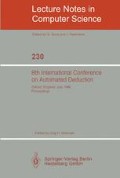Abstract
We present a new randomized parallel algorithm for term matching. Let n be the number of nodes of the directed acyclic graphs (dags) representing the terms to be matched, then our algorithm uses O(log2n) parallel time and M(n) processors, where M(n) is the complexity of n by n matrix multiplication. The number of processors is a significant improvement over previously known bounds. Under various syntactic restrictions on the form of the input dags only O(n2) processors are required in order to achieve deterministic O(log2n) parallel time. Furthermore, we reduce directed graph reachability to term matching using constant parallel time and O(n2) processors. This is strong evidence that in practice, taking M(n) to be n3, no deterministic algorithm can beat the processor bound of our randomized algorithm. We also improve the lower bound of [DKM] on the unification problem. We show that unification is logspace-complete in PTIME even if both input terms are linear, i.e., no variable appears more than once in each term.
Research supported partly by an IBM Faculty Development Award, and partly by NSF grant MCS-8210830.
Preview
Unable to display preview. Download preview PDF.
5. References
Aggarwal, A., Chazelle, B., Guibas, L., O'Dunlaing, C., and Yap, C., "Parallel computational geometry", Proc. 26th IEEE FOCS, 1985, pp. 468–478.
Clocksin, W.F., Mellish, C.S., Programming in Prolog, Springer-Verlag, 1981.
Coppersmith, D., and Winograd, S., "On the asymptotic complexity of matrix multiplication", SIAM J. Comput. 11 (1982), pp. 472–492.
Dwork, C., Kanellakis, P., Mitchell, J., "On the Sequential Nature of Unification", J. of Logic Programming 1(1), pp.35–50.
Fortune, S., Wyllie, J., "Parallelism in Random Access Machines", Proc. 10th ACM STOC, 1978, pp. 114–118.
Galil, Z., "Optimal parallel algorithms for string matching", Proc. 16th ACM STOC, 1984, pp. 240–248.
Galil, Z., and Pan., V., "Improved processor bounds for algebraic and combinatorial problems in RNC", Proc. 26th IEEE FOCS, 1985, pp. 490–496.
Goldschlager, L.M., "The Monotone and Planar Circuit Value Problems are Log Space Complete for P", SIGACT News 9(2), 1977, pp. 25–29.
G. Huet, D. Oppen, "Equations and Rewrite Rules: A Survey", in: Formal Language Theory: Perspectives and Open Problems, R.V. Book (ed), Academic Press, 1980.
Karp, R. M., Upfal, E., and Wigderson, A., "Constructing a perfect matching is in random NC", Proc. 17th ACM STOC, 1985, pp. 22–32.
Kowalski, R., "Predicate Logic as a Programming Language". Proceedings IFIP 74, 1974, pp. 569–574.
Maluszynski J., Komorowski H.J., "Unification-free Execution of Horn-clause Programs", Proc. 2nd Logic Programming Symposium, IEEE, July 1985.
Milner, R., "A Theory of Type Polymorphism in Programming", JCSS 17, 1978, pp. 348–375.
Pan, V., and Reif, J., "Efficient parallel solution of linear systems", Proc. 17th ACM STOC, 1985, pp. 143–152.
Paterson, M.S., Wegman, M.N., "Linear Unification", JCSS 16, 1978, pp.158–167.
Rabin, M.O., "Probabilistic algorithm for testing primality", J. Number Theory 12 (1980), pp. 128–138.
Reif, J., "Optimal parallel algorithms for integer sorting and graph connectivity", Proc. 26th IEEE FOCS, 1985, pp.496–505.
Robinson, J.A., "A Machine Oriented Logic Based on the Resolution Principle", JACM 12(1), 1965, pp. 23–41.
Schwartz, J.T., "Fast Probabilistic Algorithms for Verification of Polynomial Identities", JACM 27(4), 1980, pp. 701–717.
Strassen, V., "Gaussian elimination is not optimal", Numerische Mathematik 13 (1969), pp. 354–356.
Tarjan, R.E., and Vishkin, U., "Finding biconnected components and computing tree functions in logarithmic parallel time", Proc. 25th IEEE FOCS, 1984, pp. 12–20.
Vishkin, U., "Randomized speed-ups in parallel computation", Proc. 16th ACM STOC, 1984, pp. 230–239.
Vitter, J.S., and Simons, R., "New classes for parallel complexity: a study of unification and other complete problems for P", IEEE Trans. on Computers, to appear.
Yasuura, H., "On the Parallel Computational Complexity of Unification", Yajima Lab., Research Report, ER 83-01, Oct. 1983.
Author information
Authors and Affiliations
Editor information
Rights and permissions
Copyright information
© 1986 Springer-Verlag Berlin Heidelberg
About this paper
Cite this paper
Dwork, C., Kanellakis, P., Stockmeyer, L. (1986). Parallel algorithms for term matching. In: Siekmann, J.H. (eds) 8th International Conference on Automated Deduction. CADE 1986. Lecture Notes in Computer Science, vol 230. Springer, Berlin, Heidelberg. https://doi.org/10.1007/3-540-16780-3_109
Download citation
DOI: https://doi.org/10.1007/3-540-16780-3_109
Published:
Publisher Name: Springer, Berlin, Heidelberg
Print ISBN: 978-3-540-16780-8
Online ISBN: 978-3-540-39861-5
eBook Packages: Springer Book Archive

